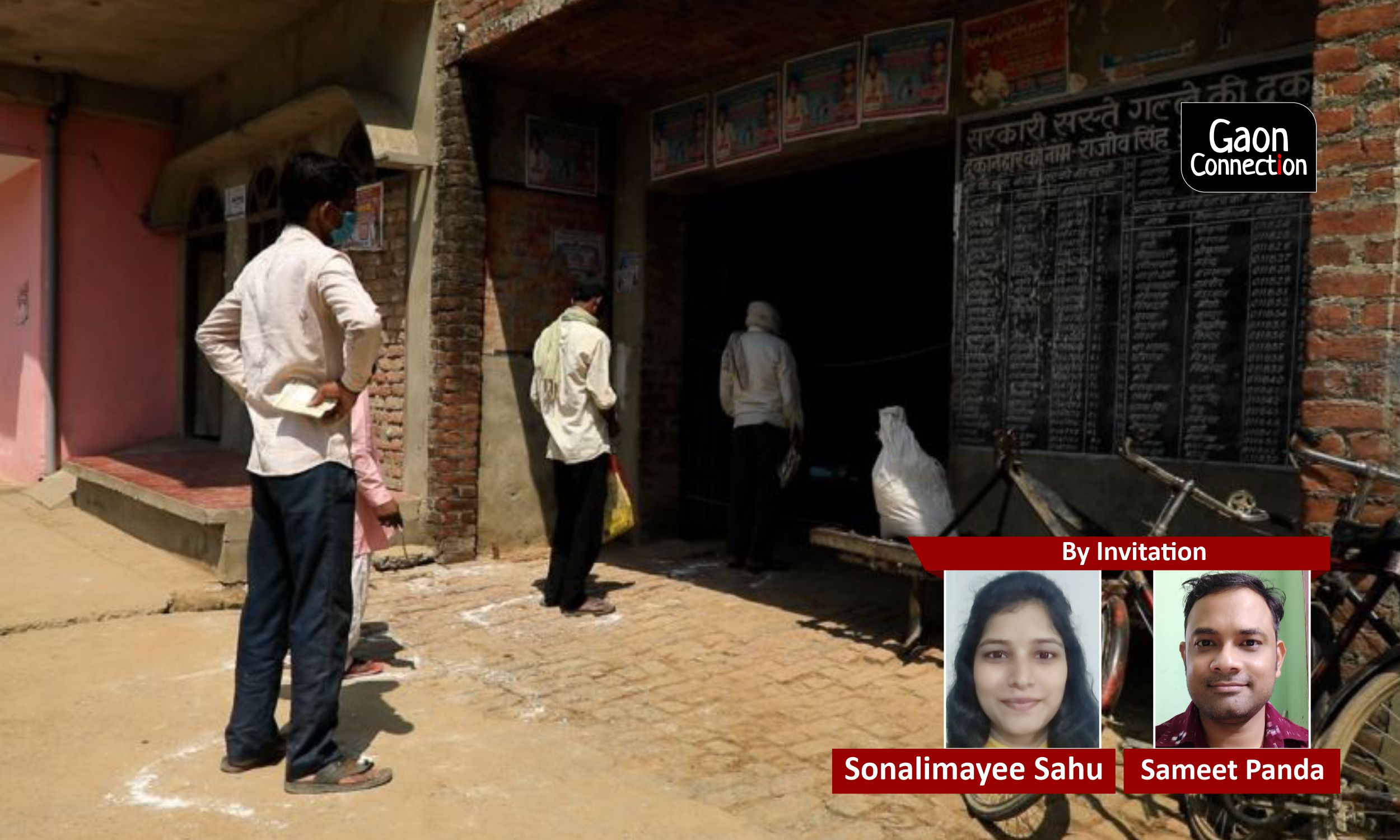The condition of migrant workers suddenly shot to the limelight in the early stages of the COVID-19 pandemic as hundreds of thousands of migrants walked several kilometres from the cities of their work to their native villages during the strict national lockdowns last year in 2020.
As work came to a grinding halt in the informal sector, migrants lost their jobs overnight and were plunged into an economic crisis.
Ironically, at the time when many workers were facing acute hardships, the godowns of the Food Corporation of India (FCI) were stocked with 119 million metric tons of food grains, including unmilled paddy, which is three times the buffer stock it was required to maintain.
Also Read: Three-fourth poor households without ration card didn’t receive government ration in lockdown
Facing criticism, the Government of India launched the Pradhan Mantri Garib Kalyan Anna Yojana under the National Food Security Act, 2013 (NFSA) to provide five kilograms (kg) of additional rice or wheat and one kg of pulses free of cost to all the ration cardholders.
Since many migrant workers do not have ration cards, the Indian government also announced free foodgrains for migrant workers who do not hold ration cards. Parallelly, the central government pushed the state governments to adopt the One Nation One Ration Card scheme to enable the portability of ration cards.
One Nation One Ration card scheme
The One Nation One Ration card scheme was launched in June 2019 to reform the Public Distribution System (PDS). About 810 million people are entitled to buy subsidied food from the designated Fair Price Shop (FPS) under the NFSA. But earlier beneficiaries were not able to access their PDS benefits outside their jurisdiction.
The One Nation One Ration Card scheme permits any migrant worker whose ration card is linked with her/his Aadhaar number to collect her share from anywhere in the country through Aadhaar based biometric or iris authentication.
Also Read: Excluded by marriage: ‘Over a million women in Odisha left out of PDS’
To maintain records and operationalise the portability of PDS entitlements, the central government has set up two centralised portals –– the Integrated Management of Public Distribution System (IM-PDS), and Annavitaran portal. These portals record all the relevant data about inter-state and intra-state foodgrain transactions by the beneficiaries, respectively.
On June 29 this year, the Supreme Court of India articulated steps to address the food crisis among migrant workers. The apex court directed the central Government to develop
(a) a database of unorganised sector workers,
(b) allocate dry rations as per the demands of the states,
(c) implement the ONORC scheme in all states by July 31, 2021,
(d) re-examine the coverage of PDS,
(e) encourage community kitchens.
The court underscored that portability of One Nation One Ration Card will be beneficial for migrants and ordered that no state can deny benefits to ration cardholders on the grounds that the ration card is not registered in that particular state.
Assessing the scheme’s implementation
As per the IM-PDS portal, in July this year, 37,719 transactions took place under the One Nation One Ration Card, benefiting 34,105 families totalling 460,228 beneficiaries.
The highest number of transactions was recorded in Delhi, though it was the last state to join the One Nation One Ration Card scheme. Compared to it, only 1,847 transactions were recorded in 14 states a year ago in July 2020, with the highest number of transactions recorded in Uttar Pradesh.
The inter-district and intra-district transactions are recorded under the Annavitaran portal. A total of 12 million transactions took place due to portability in July 2020, which increased to 13 million transactions in July 2021 –– an increase of just nine per cent.
Originally, the One Nation One Ration Card scheme was to be completed by March 2020, however after multiple extensions, the latest deadline had been extended beyond July 2021.
Between July 2020 and July 2021, sixteen states and union territories (UTs) had joined the new scheme. This was due to the central government making joining the scheme a precondition for relaxing the borrowing limit by 0.5 per cent for state governments under the Fiscal Responsibility and Budget Management Act, 2003.
This appears to be the primary reason for the increase in transactions under the scheme, rather than any direct correlation with the rate of migration between states.
For instance, the data on inter-state transactions of food grain at 37,000 transactions in July 2021 is almost negligible compared to the rate of migration in the country.
The negligible growth in transactions points to a lack of efforts to raise awareness among migrant workers and ensure on-ground portability.
Implementation challenges
Several news reports on the One Nation One Ration Card scheme, and the author’s interaction with the migrant workers, mostly from Odisha, suggest that despite the recent Supreme Court judgement, multiple implementation challenges still need to be ironed out to make the scheme work.
First, the One Nation One Ration Card scheme works on a technology platform with the Aadhaar as the base infrastructure. No person or migrant can collect their entitled ration without Aadhaar based authentication.
For a transaction to take place, it is essential that Aadhaar of each individual beneficiary is linked with their ration card; there should be a functional electronic point of sale machine (e-pos) that can read Aadhaar linked fingerprints or irises and is connected to the internet at the time of transaction.
According to the National Food Security Portal, Aadhaar has not been linked for about 10 per cent, or about 70 million PDS beneficiaries.
The percentage of ration cards linked with Aadhaar till July 2021 was quite low in north-eastern states such as Meghalaya (16.5 per cent), Assam (18 per cent), Arunachal Pradesh (59.7 per cent), and West Bengal (79.8 per cent).
The share of Aadhaar-based PDS transactions in the above states in July 2021 was nine per cent in Arunachal Pradesh, 14 per cent in West Bengal, and nil in Meghalaya and Assam. These are also the states where foodgrain transactions through PDS portability were very low.
Also Read: Three-fourth poor households without ration card didn’t receive government ration in lockdown
States with higher inter-state or intra-district foodgrain transactions through portability (Delhi, Haryana, Bihar, Maharashtra, Andhra Pradesh, and UP) report as high as 100 per cent linking of ration cards with Aadhaar, and Aadhaar based transactions are also almost 100 per cent in these states.
Thus, we can infer that functioning of the One Nation One Ration Card scheme depends upon the Aadhaar seeding, authentication, and transactions in each state, and is not necessarily linked to the number of migrants the state sends or receives at all.
Second, a proposed solution to this could be for the Indian government to push states into implementing the Supreme Court order strictly and mandate that all PDS transactions be Aadhaar authenticated with penalties for non-compliance.
However, this could potentially adversely impact beneficiaries. States like Chhattisgarh and Tamil Nadu have lower Aadhaar based transactions, at 8.25 per cent, and 65 per cent, respectively, but have effective PDS coverage in terms of types of goods, price, and efficiency of targeting.
In this context, mandatory Aadhaar based authentication of PDS purchases may or may not help migrants, but it would adversely affect PDS beneficiaries, especially the differently-abled, aged, and chronically sick, workers engaging in manual labour (which may reduce the portability of their fingerprints being authenticated) and beneficiaries who have not been able to register for Aadhaar.
The push for mandatory Aadhaar based PDS transactions could have a detrimental effect on the PDS itself which can further affect the implementation of the One Nation One Ration Card scheme.
Universalisation of the PDS
Third, we have argued in the first two paragraphs how mandatory Aadhaar based biometric authentication would exclude a large number of beneficiaries especially differently abled, aged, chronically sick and persons without Aadhaar from getting their entitled ration.
To ensure that not a single beneficiary is denied of her/his entitlement, important technologies such as non-biometric smart card-based transactions, are explored.
Also Read: Banking on Aadhaar
Fourth, migrants can only benefit from the One Nation One Ration Card scheme if they have ration cards. The NFSA, 2013 mandates that 75 per cent of the rural and 50 per cent of the urban population should be covered under the PDS, based on estimations of need. Presently, the coverage of the PDS is based on the 2011 Census, and needs to be revised based on the 2021 Census.
As a result of this, close to 100 million people are estimated to be excluded from the PDS. As the next population census is nowhere in sight, it is essential that coverage of the PDS is increased based on the projected population.
Finally, looking at the impending food and income crisis among a large population in the country on one hand, and the growing stocks of the FCI on the other, it would be wise to universalise the PDS all over the country.
Sameet Panda is associated with the Right to Food Campaign and has been working on issues around right to food, digitisation and social protection. Sonalimayee Sahu is a researcher associated with Odisha Right to Food Campaign. Part of the research is supported by the Centre for Internet and Society. Views are personal.


















